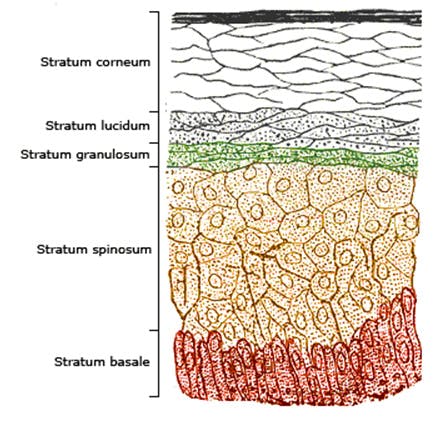
Understanding Your Skin
Skin, like the weather and our moods, does change. Changes in weather, diet, or menstrual cycle can cause your skin to feel drier, oilier or even more acne-prone. Combination skin creates confusion since we are not sure if we should continue to moisturize or not – especially where our skin is oily. Whether you have dry or oily skin, understanding your skin type is crucial. Find out what your skin type is and how to get your face to looks its absolute best!
Your skin’s function
Your skin is your body’s largest organ, and it serves to protect you. The skin reflects what is happening in your body, your mind and in your life. You could say the skin is the mirror of your health and well-being – emotionally and physically. Both the internal and external environments influence your skin’s response to how it ages, heals itself, and its overall appearance. Your skin is constantly renewing itself, with deeper layers gradually coming to the outermost layer where the skin cells are exfoliated. It typically takes healthy skin about 6 weeks to fully renew itself. Healthy skin is slightly moist, soft, flexible. It provides a layer of protection as the body’s first line of defense against diseases and environmental damages. When skin is healthy it has a smooth and fine grained texture to it. Of course, skin appearance may change with age or due to exposure to sun or other environmental factors.
Your skin’s main functions:
- Protection: an anatomical barrier from pathogens and damage between the internal and external environment in bodily defense; Langerhans cells in the skin are part of the adaptive immune system.
- Sensation: contains a variety of nerve endings that react to heat and cold, touch, pressure, vibration, and tissue injury.
- Heat regulation: the skin contains a blood supply far greater than its requirements which allows precise control of energy loss by radiation, convection and conduction.
- Control of evaporation: the skin provides a relatively dry and semi-impermeable barrier to fluid loss.
- Aesthetics and communication: others see our skin and can assess our mood, physical state and attractiveness.
- Storage and synthesis: acts as a storage center for lipids and water, as well as a means of synthesis of vitamin D by action of UV on certain parts of the skin.
- Excretion: sweat contains urea, however its concentration is 1/130th that of urine, hence excretion by sweating is at most a secondary function to temperature regulation.
- Absorption: the cells comprising the outermost 0.25–0.40 mm of the skin are “almost exclusively supplied by external oxygen”, although the “contribution to total respiration is negligible”
- Water resistance: The skin acts as a water resistant barrier so essential nutrients aren’t washed out of the body.
What affects your skin?
It matters what and how much you eat or drink, the amount of stress in your life, your daily home skincare regimen, and the time you take for good skincare. Seeing a professional skincare specialist is essential to keeping and maintaining healthy, beautiful skin. They can prescribe the perfect treatment to help resolve any unwanted skin conditions. Coupled with your good home care, you can consistently age gracefully and have healthy skin, beautiful skin all the time.
What’s my skin type?
Everyone is born with a certain skin type. There is normal/combination, oily, and dry. The skin type you are born with will be with you your whole life. As you age, the condition of your skin changes but the type stays the same.
As an example, if you’re an oily skin, you may break out with blemishes as a teenager and even into adulthood. But many times, due to internal and/or external factors, your skin may appear dry; it is not dry at all but dehydrated. Maybe you over wash or over exfoliate your skin, are not using the right moisturizer, or drink a lot of soda which can greatly dehydrate your skin; whatever the cause, the skin requires proper hydration, but you still are an oily skin regardless.
It takes a trained eye to tell the difference between a dry skin type, and dehydrated skin on an oily or normal skin type. Getting a good skin analysis by a professional skincare specialist or facial plastic surgeon is the best first step to great skin health.
Exfoliation
We shed over one million skin cells every forty minutes. Sometimes the dead cells are so small they remain in the follicle or pore of the skin and cause the pore to clog, creating a blemish. Exfoliation helps keep the skin clear, and free of dead surface skin which also can make the skin look dull and ruddy. Exfoliation at home should be gentle, not harsh and rough. Be sure you are using a professional quality product recommended for your skin type. Exfoliating 2-3 times a week is sufficient for most people. Professional exfoliation is necessary to get rid of more than just a portion of the dead surface layer. Manual exfoliation done by the professional can get down deep into the pore. Professional grade exfoliation products work great as does microdermabrasion. Microdermabrasion strips away the outer layers of the skin. It allows the skin to look smoother; it improves mild hyperpigmentation (sun spots or age spots), reduces pore size, improves acne, and minimizes fine lines and wrinkles.
The Nature of Skin Health
The dermis, a deep layer of the skin, is where all cell nourishment originates. It is where the blood vessels, nerves, oil and sweat glands live as well as the production of the collagen and elastin fibers. As the cells move upwardly through the dermis, it is vital that they stay nourished, plump, and hydrated, so when they reach the surface, the new cell appears full, fresh, and soft. Unfortunately, for a variety of reasons, our skin suffers from all the abuse we give it over the years, and it shows up outwardly on our face. Too much sun, not enough water, over abundance of alcohol, greasy foods, out of balance hormones, etc. cause all the unnecessary skin conditions that we dread. That is the time to seek out professional assistance and discover how a good skincare specialist can do wonders to bring a positive change to your skin as you age.
Skin Types
You were born with one of three skin types:
- Oily
- Normal /combination
- Dry
Skin type is determined by how much or how little oil is produced on the skin. Your skin will always be the same type, but its condition often changes. This can cause the skin to appear to have become a different type – it hasn’t.
Some conditions that cause the skin condition to change include: diet, sun damage, stress levels, hormone fluctuations, medications, and even your home skincare regimen; these all can affect how much oil is produced.
Oily Skin
Oily skin is shiny skin. It is prone to breakouts, blackheads, and acne. One good thing about an oily skin type is that it ages better than the other skin types; the oil from the sebaceous gland keeps the skin plump – less wrinkles. The key to treating the problems of any oily skin is to control the oil production. That can be done with proper skincare products and seeing a professional skincare specialist to help deep clean, refine the large pores, extract blemishes, and help draw out the bacteria from the skin so it is healthy and clean.
Picking at blemishes can cause scarring and hyperpigmentation – so don’t do it. People with oily skin type tend to be over aggressive in cleansing in an attempt to remove the excess oil, but this only stimulates the skin to produce even more oil. Let a skin care professional guide you in proper skin care. After a skin analysis, you may need more professional care from a dermatologist or doctor.
Normal/Combination Skin
Normal/combination skin is the most common. This skin type will have some oily areas on the T-zone (forehead to the nose), drier cheek area, yet an overall smooth and even texture as well as healthy tone. This skin type also needs consistent care to maintain its normal condition.
Dry Skin
Dry skin requires special care since it does not produce enough oil to keep the skin supple and moist. Dry skin ages faster, so the products used on the skin must address the flakiness, dullness and premature wrinkling that dry skin will bring. Dehydrated skin will be dry, but does not necessarily mean it is a dry skin type.
Common Skin Conditions
Acne:
This condition can occur any time and on any skin type. Oily skin is more prone to acne. It is essential to use oil free products and makeup. Do not be over aggressive in the cleansing, exfoliating of the skin since it will only produce more oil. More oil…more breakouts.
Sun Damage:
Remember back in the 60’s and 70’s when baby oil was the norm? Sun lamps and sun bathing for hours on end with no sun protection? Many of us are now paying the price for such short-sightedness with hyperpigmentation (dark spots), deep wrinkles, uneven skin tone, and broken capillaries. SkinMedica has many facial treatments to address these conditions and help resolve these conditions that were caused years ago.
Hyperpigmentation:
Hyperpigmentation, or dark spots on the skin, occurs in both women and men. Some common causes are aging, allergic reactions, cosmetic irritants, sun damage, inflammation, and acne. This condition is the most difficult to resolve and takes a commitment of up to six months to achieve the desired result. Skin lightening agents work well but need to be used consistently. The use of broad-spectrum sunscreen is important to prevent further darkening of the spots. Hyperpigmentation can be treated at the epidermal level to stop or prohibit production of melanin. The deeper dermal hyperpigmentation should be discussed with your dermatologist. Peels and lightening treatments are recommended and prove to achieve results over time.
Sensitive/Rosacea:
If you easily break out in rashes and get blotchy, itchy, or stinging skin in response to products or the weather, you may have sensitized skin. If it appears to be more serious it could be rosacea, a skin disorder with facial flushing, red blotches, and inflammation which can make skin overly sensitive; so can eczema.If your sensitized skin concerns you, see a dermatologist to rule out the possibility of the more serious disorder of the skin: rosacea.Those with easily irritated skin should play it safe with their face. Skip products containing alcohol, beta hydroxy acids, and retinoids. Lanolin, used in many over-the-counter moisturizers to soften skin, can also cause allergic reactions; so can common preservatives that extend a product’s shelf life, such as parabens. Use products with hydrating, anti-inflammatory natural or botanical ingredients in order to calm the skin and support its barrier function. Be aware of other sources of skin irritations that include fragrances which companies use to mask the chemical smells in scented creams – it’s best to use “fragrance free” products. If you’re experiencing unexplained redness, itching, or blistering, it may be time to make a change – your skin will love you for it!
What is your skin actually made of?
The Dermis is composed of collagen (which is a type of protein) fibers. The blood vessels, fat cells, oil and sweat glands that go through this layer are held together by these collagen fibers. Collagen typically makes up about 70% of the dermis and allows for the natural stretching and contraction of the skin as well as providing strength. Collagen is also one of the many components of the skin involved in the healing of wounds. Moisture is very important to keeping this network of collagen fibers supple.
As skin ages or becomes damaged, collagen fibers lose their flexibility. That is one reason older skin is not as elastic and “tight” as youthful skin, and one of the reasons wrinkles occur as we age.



